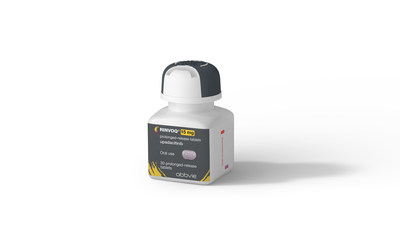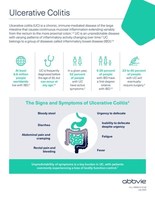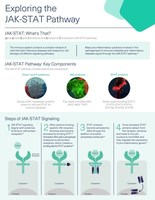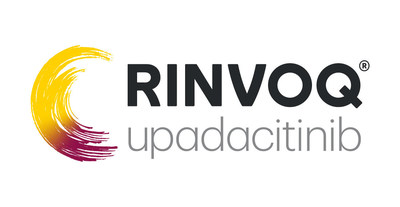European Commission Approves RINVOQ® (upadacitinib) for the Treatment of Adults With Moderate to Severe Ulcerative Colitis
The European Commission has approved RINVOQ (upadacitinib) for adults with moderately to severely active ulcerative colitis, marking its fifth indication in the EU. This decision is supported by three Phase 3 studies demonstrating significant clinical remission, response, and mucosal healing at weeks 8 and 52. Specifically, 26-33% of patients achieved clinical remission at week 8 during induction, and 42-52% at week 52 during maintenance, compared to 4-12% for placebo. Safety results were consistent with prior data, with no new significant risks identified.
- European Commission approval for RINVOQ for ulcerative colitis expands treatment options in the EU.
- Clinical trials demonstrated effective clinical remission rates of 26-33% at week 8 for induction and 42-52% at week 52 for maintenance therapy.
- Safety profile of RINVOQ remains consistent with previous studies, showing no new significant risks.
- None.
Insights
Analyzing...
- RINVOQ (upadacitinib) is now approved by the European Commission for the treatment of adult patients with moderately to severely active ulcerative colitis who have had an inadequate response, lost response or were intolerant to either conventional therapy or a biologic agent1
- The approval is based on the results of three Phase 3 studies: two for induction and one for maintenance1,2
- In these clinical trials, RINVOQ achieved the primary endpoint of clinical remission (per Adapted Mayo Score) at week 8 in induction studies and week 52 in the maintenance study, and all secondary endpoints, including clinical response and mucosal healing1,2
- Safety results in ulcerative colitis were generally consistent with the known safety profile of RINVOQ, with no new important safety risks observed2,3-6
- Ulcerative colitis is a chronic, immune-mediated inflammatory bowel disease (IBD) that can lead to substantial burden and often disability among patients.7-9 At least 6.8 million people worldwide live with IBD, including ulcerative colitis10
- The approval represents RINVOQ's fifth therapeutic indication in the EU
NORTH CHICAGO, Ill., July 26, 2022 /PRNewswire/ -- AbbVie (NYSE: ABBV) today announced the European Commission (EC) approved RINVOQ® (upadacitinib 45 mg [induction dose] and 15 mg and 30 mg [maintenance doses]) for the treatment of adult patients with moderately to severely active ulcerative colitis who have had an inadequate response, lost response or were intolerant to either conventional therapy or a biologic agent.*
"Our years of experience and long-term investment in IBD research have given us invaluable insights into the challenges that ulcerative colitis patients face, and a deep understanding of the ongoing need for additional treatment options to help those still suffering," said Thomas Hudson, M.D., senior vice president, research and development, chief scientific officer, AbbVie. "We celebrate today's approval of RINVOQ by the EC as it meaningfully expands our ability to help indicated patients in need of relief from ulcerative colitis."
The EC approval is supported by data from two induction studies, U-ACHIEVE induction and U-ACCOMPLISH, and one maintenance study, U-ACHIEVE maintenance.2 Statistical significance was achieved for the primary endpoint and all secondary endpoints with RINVOQ 45 mg in the two induction studies and both RINVOQ 15 mg and 30 mg in the maintenance study.
Clinical Remission†
- During the U-ACHIEVE and U-ACCOMPLISH induction trials, 26 percent and 33 percent of patients treated with RINVOQ 45 mg achieved clinical remission at week 8, the primary endpoint, compared to 5 percent and 4 percent of patients who received placebo.2,11,12
- During the U-ACHIEVE maintenance trial, 42 percent and 52 percent of patients treated with RINVOQ 15 mg or 30 mg, respectively, achieved clinical remission at week 52, the primary endpoint, compared to 12 percent of patients who received placebo.2,13
- Additionally, 57 percent and 68 percent of patients receiving RINVOQ 15 mg or 30 mg, respectively, achieved corticosteroid-free remission, defined as clinical remission (per Adapted Mayo Score) and corticosteroid free for ≥90 days immediately preceding week 52 among patients who achieved clinical remission at the end of the induction treatment, compared to 22 percent of patients on placebo.2,13
Clinical Response & Mucosal Healing‡§
- Seventy-three and 74 percent of patients treated with RINVOQ 45 mg achieved clinical response (per Adapted Mayo Score) at week 8 compared to 27 and 25 percent of patients receiving placebo during the U-ACHIEVE and U-ACCOMPLISH induction trials, respectively. 1,2,11,12,14
- In both trials, a significantly greater proportion of patients experienced clinical response per partial Adapted Mayo Score (symptomatic response) as early as week 2 (U-ACHIEVE: 60 percent vs 27 percent and U-ACCOMPLISH: 63 percent vs 26 percent).1,2,11,12,14
- Mucosal healing was observed in 36 percent and 44 percent of patients treated with RINVOQ 45 mg in U-ACHIEVE and U- ACCOMPLISH, respectively, at week 8, compared to 7 percent and 8 percent of patients, respectively, who received placebo.1,2
- In the maintenance study at week 52, mucosal healing was observed in 49 percent and 62 percent of patients treated with RINVOQ 15 mg and 30 mg, respectively, compared to 14 percent who received placebo.1,2,13
"Patients with ulcerative colitis live with unpredictable, often painful symptoms that significantly impact their quality of life, including emotional, social and economic impacts," said Séverine Vermeire, M.D., Ph.D., professor of gastroenterology at University Hospital Leuven in Leuven, Belgium. "RINVOQ demonstrated the ability to help patients experience improvements in disease parameters such as durable clinical remission and mucosal healing at week eight of induction therapy and week 52 of maintenance therapy. These results represent an exciting possibility for patients who continue to experience active disease despite treatment with conventional or biologic therapy."
In the placebo-controlled ulcerative colitis induction and maintenance clinical trials, the overall safety findings were generally consistent with the known safety profile of upadacitinib; no new important safety risks were observed.1 The rates of overall adverse events (AE), serious AEs, and AEs resulting in treatment discontinuation were lower with upadacitinib compared to placebo.1 The most commonly reported adverse reactions (≥5 percent of patients) with RINVOQ 45 mg, 30 mg or 15 mg were upper respiratory tract infection, blood CPK increased, acne, neutropaenia, and rash.1 In the overall clinical program, major cardiovascular events, thrombotic events, malignancy excluding non-melanoma skin cancer, and gastrointestinal perforation were reported infrequently (all <1.0 cases per 100 patient-years in patients who received at least one RINVOQ dose).1
About the U-ACHIEVE Induction, U-ACCOMPLISH and U-ACHIEVE Maintenance Studies2,6,15,16
The three Phase 3 studies are multicenter, randomized, double-blind, placebo-controlled studies to evaluate the efficacy and safety of RINVOQ 45 mg once daily as induction therapy, and RINVOQ 15 mg and 30 mg once daily as maintenance therapy in subjects with moderate to severe ulcerative colitis. The results of these studies were published in The Lancet in May 2022. More information can be found on http://www.clinicaltrials.gov (NCT03006068, NCT03653026, NCT02819635).
About RINVOQ® (upadacitinib)
Discovered and developed by AbbVie scientists, RINVOQ is a selective and reversible JAK inhibitor that is being studied in several immune-mediated inflammatory diseases.1,2,3-6,17,18 In human cellular assays, RINVOQ preferentially inhibits signalling by JAK1 or JAK1/3 with functional selectivity over cytokine receptors that signal via pairs of JAK2.1
Phase 3 trials of RINVOQ in rheumatoid arthritis, atopic dermatitis, psoriatic arthritis, axial spondyloarthritis, Crohn's disease, ulcerative colitis, giant cell arteritis and Takayasu arteritis are ongoing.4-6,15-22
EU Indications and Important Safety Information about RINVOQ® (upadacitinib)1
Indications
Ulcerative colitis
RINVOQ is indicated for the treatment of adult patients with moderately to severely active ulcerative colitis (UC) who have had an inadequate response, lost response or were intolerant to either conventional therapy or a biologic agent.
Rheumatoid arthritis
RINVOQ is indicated for the treatment of moderate to severe active rheumatoid arthritis (RA) in adult patients who have responded inadequately to, or who are intolerant to one or more disease-modifying anti-rheumatic drugs (DMARDs). RINVOQ may be used as monotherapy or in combination with methotrexate.
Psoriatic arthritis
RINVOQ is indicated for the treatment of active psoriatic arthritis (PsA) in adult patients who have responded inadequately to, or who are intolerant to one or more DMARDs. RINVOQ may be used as monotherapy or in combination with methotrexate.
Ankylosing spondylitis
RINVOQ is indicated for the treatment of active ankylosing spondylitis (AS) in adult patients who have responded inadequately to conventional therapy.
Atopic dermatitis
RINVOQ is indicated for the treatment of moderate to severe atopic dermatitis (AD) in adults and adolescents 12 years and older who are candidates for systemic therapy.
Important Safety Information
Contraindications
RINVOQ is contraindicated in patients hypersensitive to the active substance or to any of the excipients, in patients with active tuberculosis (TB) or active serious infections, in patients with severe hepatic impairment, and during pregnancy.
Special warnings and precautions for use
Immunosuppressive medicinal products
Use in combination with other potent immunosuppressants is not recommended.
Serious infections
Serious and sometimes fatal infections have been reported in patients receiving upadacitinib. The most frequent serious infections reported included pneumonia and cellulitis. Cases of bacterial meningitis have been reported. Among opportunistic infections, TB, multidermatomal herpes zoster, oral/esophageal candidiasis, and cryptococcosis have been reported with upadacitinib. As there is a higher incidence of infections in patients ≥65 years of age, caution should be used when treating this population. Upadacitinib should be interrupted if a patient develops serious or opportunistic infection.
Tuberculosis
Patients should be screened for TB before starting RINVOQ. RINVOQ should not be given to patients with active TB. Anti-TB therapy may be appropriate for select patients in consultation with a physician with expertise in the treatment of TB. Patients should be monitored for the development of signs and symptoms of TB.
Viral reactivation
Viral reactivation, including cases of herpes zoster, was reported in clinical studies. The risk of herpes zoster appears to be higher in Japanese patients treated with upadacitinib. Consider interruption of upadacitinib if patient develops herpes zoster.
Vaccinations
The use of live, attenuated vaccines during or immediately prior to therapy is not recommended. It is recommended that patients be brought up to date with all immunizations, including prophylactic zoster vaccinations, prior to initiating upadacitinib, in agreement with current immunization guidelines.
Malignancy
The risk of malignancies, including lymphoma is increased in patients with rheumatoid arthritis. Malignancies, including nonmelanoma skin cancer (NMSC), have been reported in patients treated with upadacitinib. Consider the risks and benefits of upadacitinib treatment prior to initiating therapy in patients with a known malignancy other than a successfully treated NMSC or when considering continuing upadacitinib therapy in patients who develop a malignancy. Periodic skin examination is recommended for patients who are at increased risk for skin cancer.
Hematological abnormalities
Treatment should not be initiated, or should be temporarily interrupted, in patients with hematological abnormalities observed during routine patient management.
Diverticulitis
Upadacitinib should be used with caution in patients with diverticular disease and especially in patients chronically treated with concomitant medications associated with an increased risk of diverticulitis.
Cardiovascular risk
RA patients have an increased risk for cardiovascular disorders. Patients treated with upadacitinib should have risk factors (e.g., hypertension, hyperlipidemia) managed as part of usual standard of care.
Lipids
Upadacitinib treatment was associated with dose-dependent increases in lipid parameters, including total cholesterol, low-density lipoprotein cholesterol, and high-density lipoprotein cholesterol.
Hepatic transaminase elevations
Treatment with upadacitinib was associated with an increased incidence of liver enzyme elevation compared to placebo. If alanine transaminase (ALT) or aspartate transaminase (AST) increases are observed and drug-induced liver injury is suspected, upadacitinib should be interrupted until the diagnosis is excluded.
Venous thromboembolisms
Events of deep vein thrombosis (DVT) and pulmonary embolism (PE) have been reported in patients receiving JAK inhibitors, including upadacitinib. Upadacitinib should be used with caution in patients at high risk for DVT/PE. If DVT/PE occur, upadacitinib should be discontinued and patients should be evaluated and treated appropriately.
Elderly
There is an increased risk of adverse reactions with the upadacitinib dose of 30 mg once daily in patients aged 65 years and older. The recommended dose for long-term use is 15 mg once daily for this patient population.
Adverse reactions
The most commonly reported adverse reactions in RA, PsA, and AS clinical trials (≥
The most commonly reported adverse reactions in atopic dermatitis trials (≥
The most commonly reported adverse reactions in UC trials (≥
The most common serious adverse reactions were serious infections.
The safety profile of upadacitinib with long term treatment was generally similar to the safety profile during the placebo-controlled period across indications.
This is not a complete summary of all safety information.
See RINVOQ full summary of product characteristics (SmPC) at www.ema.europa.eu.
Globally, prescribing information varies; refer to the individual country product label for complete information.
About AbbVie in Gastroenterology
With a robust clinical trial program, AbbVie is committed to cutting-edge research to drive exciting developments in inflammatory bowel diseases (IBD), like ulcerative colitis and Crohn's disease. By innovating, learning and adapting, AbbVie aspires to eliminate the burden of IBD and make a positive long-term impact on the lives of people with IBD. For more information on AbbVie in gastroenterology, visit https://www.abbvie.com/our-science/therapeutic-focus-areas/immunology/immunology-focus-areas/gastroenterology.html.
About AbbVie
AbbVie's mission is to discover and deliver innovative medicines that solve serious health issues today and address the medical challenges of tomorrow. We strive to have a remarkable impact on people's lives across several key therapeutic areas: immunology, oncology, neuroscience, eye care, virology, women's health and gastroenterology, in addition to products and services across our Allergan Aesthetics portfolio. For more information about AbbVie, please visit us at www.abbvie.com. Follow @abbvie on Twitter, Facebook, LinkedIn or Instagram.
Forward-Looking Statements
Some statements in this news release are, or may be considered, forward-looking statements for purposes of the Private Securities Litigation Reform Act of 1995. The words "believe," "expect," "anticipate," "project" and similar expressions, among others, generally identify forward-looking statements. AbbVie cautions that these forward-looking statements are subject to risks and uncertainties that may cause actual results to differ materially from those indicated in the forward-looking statements. Such risks and uncertainties include, but are not limited to, failure to realize the expected benefits from AbbVie's acquisition of Allergan plc ("Allergan"), failure to promptly and effectively integrate Allergan's businesses, competition from other products, challenges to intellectual property, difficulties inherent in the research and development process, adverse litigation or government action, changes to laws and regulations applicable to our industry and the impact of public health outbreaks, epidemics or pandemics, such as COVID-19. Additional information about the economic, competitive, governmental, technological and other factors that may affect AbbVie's operations is set forth in Item 1A, "Risk Factors," of AbbVie's 2021 Annual Report on Form 10-K, which has been filed with the Securities and Exchange Commission, as updated by its subsequent Quarterly Reports on Form 10-Q. AbbVie undertakes no obligation to release publicly any revisions to forward-looking statements as a result of subsequent events or developments, except as required by law.
References:
- Abbvie, Ltd. RINVOQ (upadacitinib) [summary of product characteristics]. Accessed April 12, 2022. https://www.ema.europa.eu/en/documents/product-information/rinvoq-epar-product-information_en.pdf
- Danese S, Vermeire S, Zhou W, et al. Upadacitinib as induction and maintenance therapy for moderately to severely active ulcerative colitis: results from three phase 3, multicentre, double-blind, randomised trials. The Lancet. 2022;399(10341):2113- 2128. doi:10.1016/S0140-6736(22)00581-5
- Mease PJ, Lertratanakul A, Anderson JK, et al. Upadacitinib for psoriatic arthritis refractory to biologics: SELECT-PsA 2. Annals of the Rheumatic Diseases. 2021;80(3):312-320. doi:10.1136/annrheumdis-2020-218870
- Guttman-Yassky E, Teixeira HD, Simpson EL, et al. Once-daily upadacitinib versus placebo in adolescents and adults with moderate-to-severe atopic dermatitis (Measure Up 1 and Measure Up 2): results from two replicate double-blind, randomised controlled phase 3 trials. The Lancet. 2021;397(10290):2151-2168. doi:10.1016/S0140-6736(21)00588-2
- van der Heijde D, Song IH, Pangan AL, et al. Efficacy and safety of upadacitinib in patients with active ankylosing spondylitis (SELECT-AXIS 1): a multicentre, randomised, double-blind, placebo-controlled, phase 2/3 trial. Lancet. 2019;394(10214):2108- 2117. doi:10.1016/S0140-6736(19)32534-6
- A Study to Evaluate the Long-Term Safety and Efficacy of Upadacitinib (ABT-494) in Participants with Ulcerative Colitis (UC). Clinicaltrials.gov; 2022. Accessed March 31, 2022. https://clinicaltrials.gov/ct2/show/NCT03006068
- Gajendran M, Loganathan P, Jimenez G, et al. A comprehensive review and update on ulcerative colitis. Dis Mon. 2019;65(12):100851. doi:10.1016/j.disamonth.2019.02.004
- Crohn's & Colitis Foundation. The facts about inflammatory bowel diseases. Crohn's & Colitis Foundation. Published November 2014. Accessed August 13, 2021. https://www.crohnscolitisfoundation.org/sites/default/files/2019-02/Updated%20IBD%20Factbook.pdf
- Mehta F. Report: economic implications of inflammatory bowel disease and its management. Am J Manag Care. 2016;22(3 Suppl):s51-60.
- Alatab S, Sepanlou SG, Ikuta K, et al. The global, regional, and national burden of inflammatory bowel disease in 195 countries and territories, 1990–2017: a systematic analysis for the Global Burden of Disease Study 2017. Lancet Gastroenterol Hepatol. 2020;5(1):17-30. doi:10.1016/S2468-1253(19)30333-4
- Second phase 3 induction study confirms upadacitinib (RINVOQTM) improved clinical, endoscopic and histologic outcomes in ulcerative colitis patients. AbbVie News Center. Published February 22, 2021. Accessed April 17, 2022. https://news.abbvie.com/news/press-releases/second-phase-3-induction-study-confirms-upadacitinib-rinvoq-improved-clinical-endoscopic-and-histologic-outcomes-in-ulcerative-colitis-patients.htm
- RINVOQ® (upadacitinib) receives FDA approval for the treatment of adults with moderately to severely active ulcerative colitis. AbbVie News Center. Published March 16, 2022. Accessed April 7, 2022. https://news.abbvie.com/news/press-releases/rinvoq-upadacitinib-receives-fda-approval-for-treatment-adults-with-moderately-to-severely-active-ulcerative-colitis.htm
- Upadacitinib (RINVOQ®) met the primary and all secondary endpoints in the 52-week phase 3 maintenance study in ulcerative colitis patients. AbbVie News Center. Published June 29, 2021. Accessed April 17, 2022. https://news.abbvie.com/news/press-releases/upadacitinib-rinvoq-met-primary-and-all-secondary-endpoints-in-52-week-phase-3-maintenance-study-in-ulcerative-colitis-patients.htm
- Upadacitinib (RINVOQTM) meets primary and all ranked secondary endpoints in first phase 3 induction study in ulcerative colitis. AbbVie News Center. Published December 9, 2020. Accessed April 1, 2022. https://news.abbvie.com/alert-topics/immunology/upadacitinib-rinvoq-meets-primary-and-all-ranked-secondary-endpoints-in-first-phase-3-induction-study-in-ulcerative-colitis.htm
- A Study of the Efficacy and Safety of Upadacitinib (ABT-494) in Participants with Moderately to Severely Active Ulcerative Colitis. clinicaltrials.gov; 2022. Accessed March 31, 2022. https://clinicaltrials.gov/ct2/show/NCT03653026
- A Study to Evaluate the Safety and Efficacy of Upadacitinib (ABT-494) for Induction and Maintenance Therapy in Participants with Moderately to Severely Active Ulcerative Colitis (UC). clinicaltrials.gov; 2022. Accessed March 31, 2022. https://clinicaltrials.gov/ct2/show/NCT02819635
- AbbVie. A Study to Evaluate the Efficacy and Safety of Upadacitinib in Subjects with Takayasu Arteritis (TAK) (SELECT-TAK). clinicaltrials.gov; 2021. Accessed May 19, 2022. https://clinicaltrials.gov/ct2/show/NCT04161898
- A Study to Evaluate Efficacy and Safety of Upadacitinib in Adult Participants with Axial Spondyloarthritis. clinicaltrials.gov; 2021. Accessed May 9, 2022. https://clinicaltrials.gov/ct2/show/NCT04169373
- Burmester GR, Kremer JM, Van den Bosch F, et al. Safety and efficacy of upadacitinib in patients with rheumatoid arthritis and inadequate response to conventional synthetic disease-modifying anti-rheumatic drugs (SELECT-NEXT): a randomised, double- blind, placebo-controlled phase 3 trial. Lancet. 2018;391(10139):2503-2512. doi:10.1016/S0140-6736(18)31115-2
- Cohen SB, van Vollenhoven RF, Winthrop KL, et al. Safety profile of upadacitinib in rheumatoid arthritis: integrated analysis from the SELECT phase III clinical programme. Ann Rheum Dis. Published online October 28, 2020:annrheumdis-2020-218510. doi:10.1136/annrheumdis-2020-218510
- A Study to Evaluate the Safety and Efficacy of Upadacitinib in Participants with Giant Cell Arteritis. clinicaltrials.gov; 2022. Accessed May 19, 2022. https://clinicaltrials.gov/ct2/show/NCT03725202
- A Maintenance and Long-Term Extension Study of the Efficacy and Safety of Upadacitinib (ABT-494) in Participants with Crohn's Disease Who Completed the Studies M14-431 or M14-433. clinicaltrials.gov; 2022. Accessed April 12, 2022. https://clinicaltrials.gov/ct2/show/NCT03345823
* This approval is without prejudice to the final conclusions of the ongoing referral procedure under Article 20 of Regulation (EC) No 726/2004 resulting from pharmacovigilance data.
† Clinical remission (per Adapted Mayo Score) is defined as stool frequency subscore (SFS) ≤1 and not greater than baseline, rectal bleeding subscore (RBS) of 0 and endoscopic subscore ≤1 without friability.
‡ Clinical response (per Adapted Mayo Score) is defined as a decrease from baseline in the Adapted Mayo score ≥2 points and ≥30 percent from baseline, plus a decrease in RBS ≥1 or an absolute RBS ≤1.
§ Mucosal healing is defined as endoscopic subscore ≤1 without friability.
![]() View original content to download multimedia:https://www.prnewswire.com/news-releases/european-commission-approves-rinvoq-upadacitinib-for-the-treatment-of-adults-with-moderate-to-severe-ulcerative-colitis-301592997.html
View original content to download multimedia:https://www.prnewswire.com/news-releases/european-commission-approves-rinvoq-upadacitinib-for-the-treatment-of-adults-with-moderate-to-severe-ulcerative-colitis-301592997.html
SOURCE AbbVie











